10 books that changed my life
📖Books,👨🏼💻iMagazine,⭐️Featured
In a world that rewards busyness over progress, these 10 books taught me how to go fast while slowing down and create more with less. From the micro improvements of Atomic Habits to the focus of Deep Work, from the clarity of Essentialism and The One Thing to the structure of Getting Things Done and The 7 Habits of Highly Effective People — these ideas reshaped how I think, work and live. Better yet, these books are helping me design my app - Nozbe - that thousands of smart business owners use to get their professional and private life organized in a simple way. Below you’ll find how each of these 10 books impacted me personally and why I come back to them every so often:
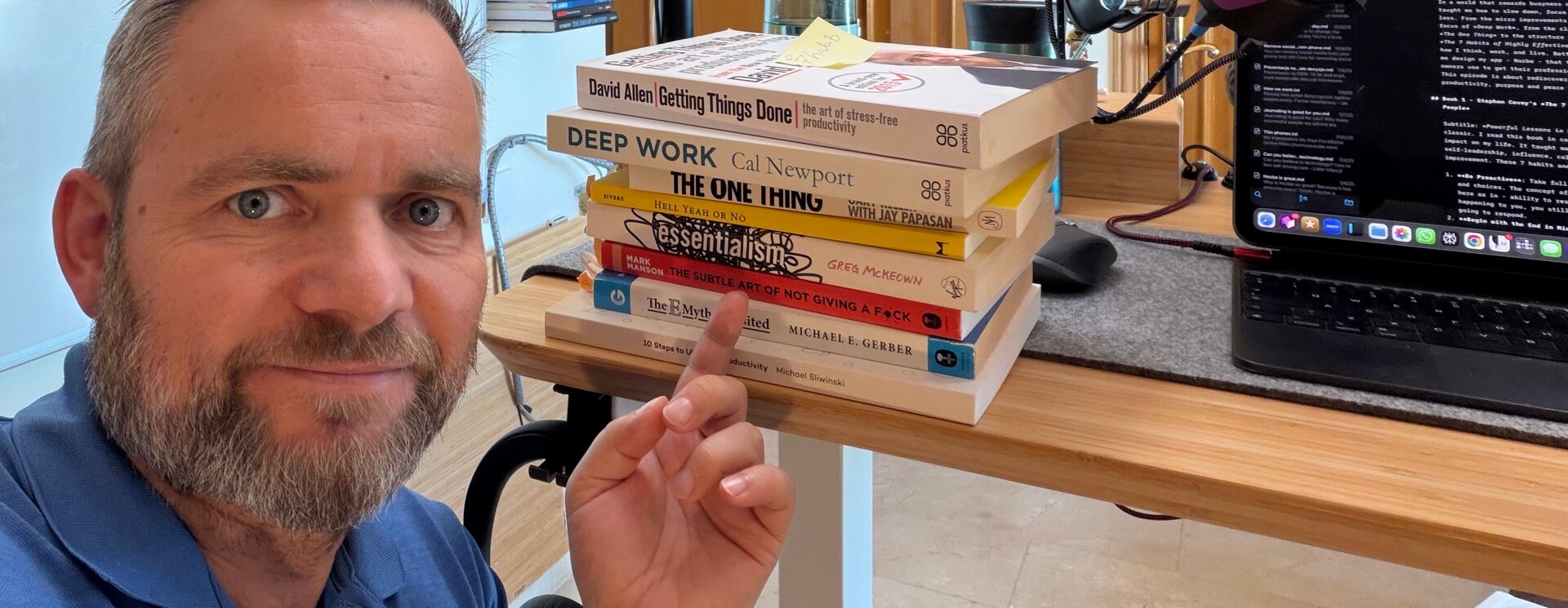
- Book 1 - Stephen Covey’s The 7 Habits of Highly Effective People
- Book 2 - David Allen’s Getting Things Done
- Book 3 - Cal Newport’s Deep Work
- Book 4 - Gary Keller and Jay Papasan’s One Thing
- Book 5 - Derek Sivers’ Hell Yeah or No
- Book 6 - Greg McKeown’s Essentialism
- Book 7 - James Clear’s Atomic Habits
- Book 8 - Mark Manson’s Subtle Art of Not Giving a Fuck
- Book 9 - Michael Gerber’s The E‑Myth
- Book 10 - my very own 10 Steps to Ultimate Productivity
- These are my top 10 books of all time - what are yours?
- P.S. I’ve discussed these books on my podcast…
Book 1 - Stephen Covey’s The 7 Habits of Highly Effective People
Do you know which was the first book to inspire my interest in productivity and personal development? Yes, it was the iconic “7 Habits of Highly Effective People - Powerful Lessons in Personal Change” by Stephen Covey. It taught me the principles of effective self-leadership, influence, collaboration and constant improvement.
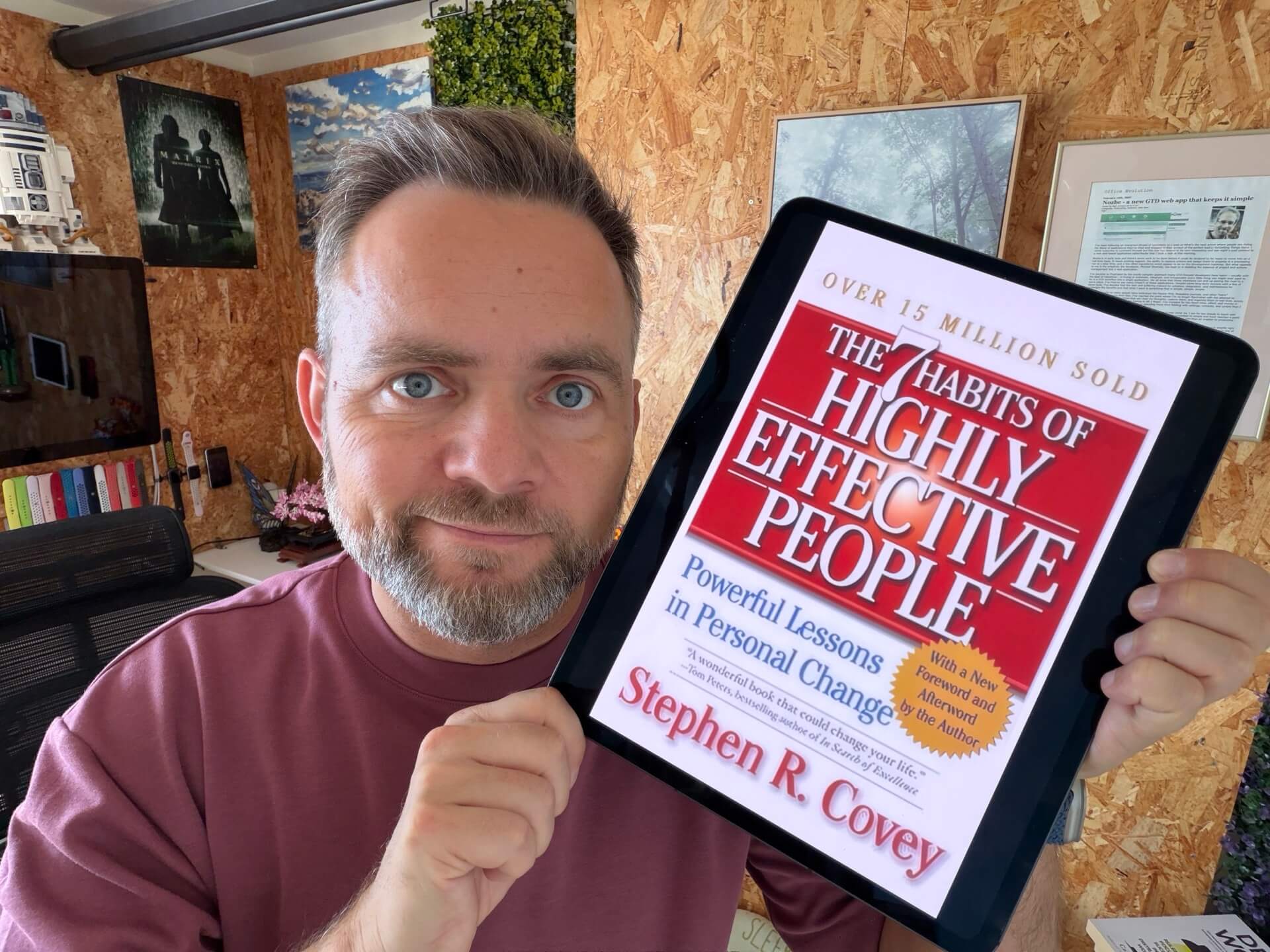
Here are these 7 habits and what they mean to me:
- Be Proactive: Take full responsibility for your actions and choices. The concept of “responsibility” stuck with me here as in - “ability to respond” - even if things are happening to you, you still have a choice as to how you’re going to respond.
- Begin with the End in Mind: Define a clear vision of your life goals and core values. I’ve always wanted to work from home, to have freedom to work from anywhere #NoOffice style. And look at me now - that’s exactly what I’m doing.
- Put First Things First: Prioritize important tasks that contribute to your long-term goals over urgent but less meaningful distractions. I’ve been always thinking long term, and I’ve been running Nozbe for the last 18 years now. What’s a long term?
- Think Win-Win: Adopt a mindset seeking mutual benefit in all interactions. I’ve always preferred to choose trust and cooperation rather than competition. I’m not very competitive but I’m very trustworthy.
- Seek First to Understand, Then to Be Understood: Practice empathetic listening before sharing your perspective. As a person who is talking a lot, I had to learn it…
- Synergize: Leverage diverse perspectives through collaboration to achieve solutions greater than individual efforts alone. One of my GALLUP talents is maximizer, so it perfectly fits with me!
- Sharpen the Saw: Work-life balance. There’s time for work and for relax, leisure and sports. That’s why I keep training for triathlons.
Overall, this book introduced me to productivity and inspired me to keep trying to be a better person. Have you read it?
📕 Get Stephen Covey’s The 7 Habits of Highly Effective People on Amazon or Audible.
💬 Discuss this book on Mastodon or LinkedIn.
Book 2 - David Allen’s Getting Things Done
Back in the day right after college I felt disorganized. I needed something that would help me build some kind of structure. While I loved the Stephen Covey’s “7 habits”, I needed something practical. This is when my friend suggested me the GTD book - “Getting Things Done” by David Allen. It literally changed my life. I discovered the promise from the subtitle: The Art of Stress-free Productivity.
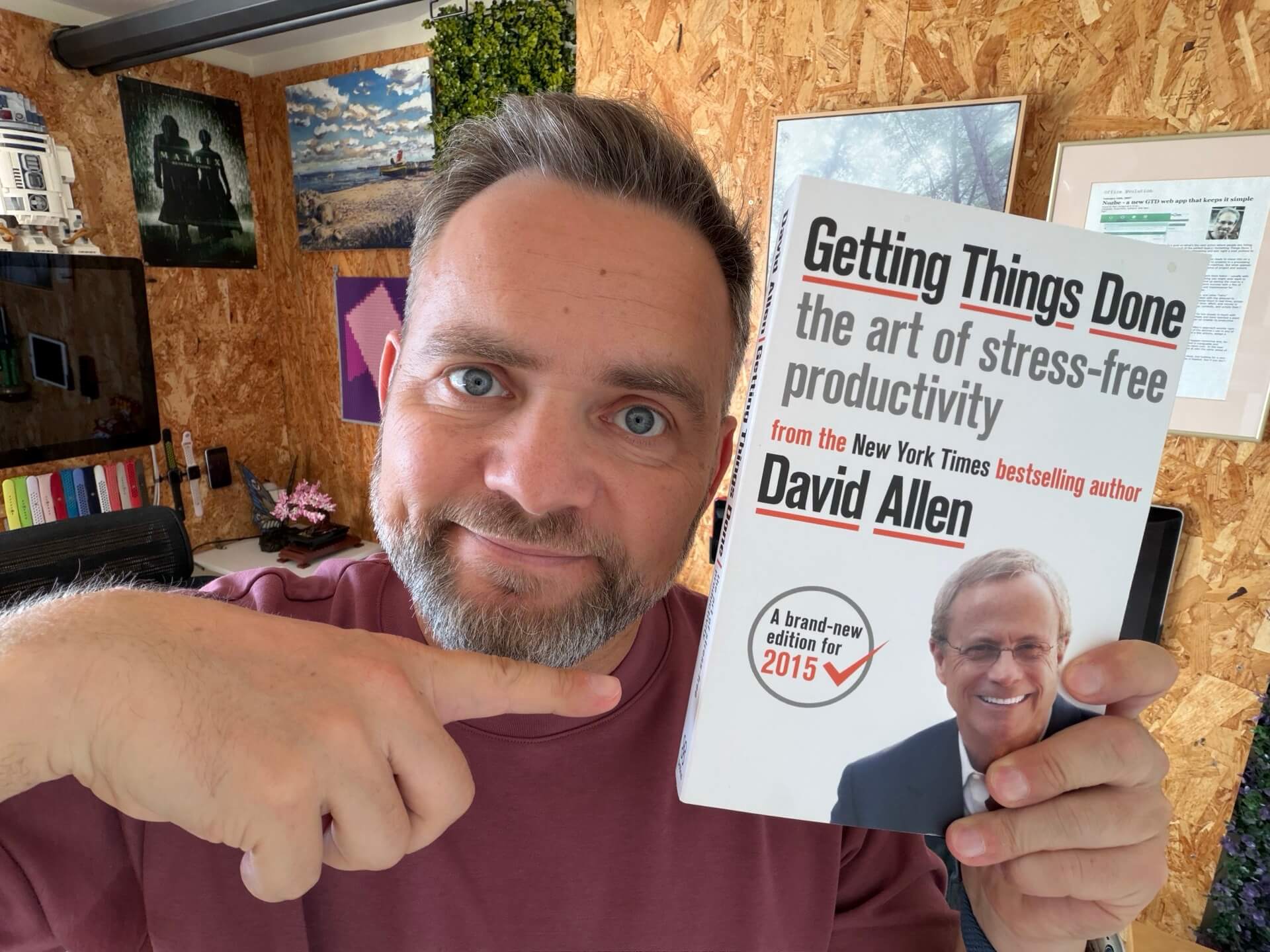
I started building my own trusted productivity system. Later inspired by it, I decided to make it digital and this is how my app - Nozbe - was created. My app was successful because many GTD enthusiasts also found it as THE way to implement GTD.
The main key takeaway from this book is that your mind is a poor place to store information to do. If something needs to get done it has to be saved in your trusted system and set up like this that you’re being reminded of it only when necessary.
The GTD methodology centers around five key steps:
- Capture: Collect everything that requires attention in a trusted system (inboxes, notes, apps).
- Clarify: Determine if each item is actionable. If yes, define the next actionable step. If it takes less than two minutes, do it immediately (the famous Two-Minute Rule).
- Organize: Sort tasks into projects. Everything that takes several steps is a project. Optionally assign contexts to tasks. Put time-sensitive tasks in your calendar.
- Reflect: Regularly review all lists and projects. This is the main inspiration for our Fridays at Nozbe where we have dedicated time for a Weekly Review.
- Engage: Use your organized system to decide what to work on in the moment based on context, time, energy, and priorities.
When I started building Nozbe I focused on making it super easy to add tasks to the system, to organize them in projects and to easily mark with a star my next actions?. I loved asking myself: What’s the next physical action that moves this project forward?.
One year after launching Nozbe I had a pleasure of meeting the author, David Allen, in person. We became friends and I visited him one year later in his house in Ojai, California. I interviewed him for the episode 43 of #NoOffice podcast.
📕 Get David Allen’s Getting Things Done on Amazon or Audible.
💬 Discuss this book on Mastodon or LinkedIn.
Book 3 - Cal Newport’s Deep Work
How to focus in a world full of distractions? As I was having success with running Nozbe I had increasing problems finding time for focused work. Cal Newport’s “Deep Work” helped me immensely finding: Rules for Focused Success in a Distracted World.
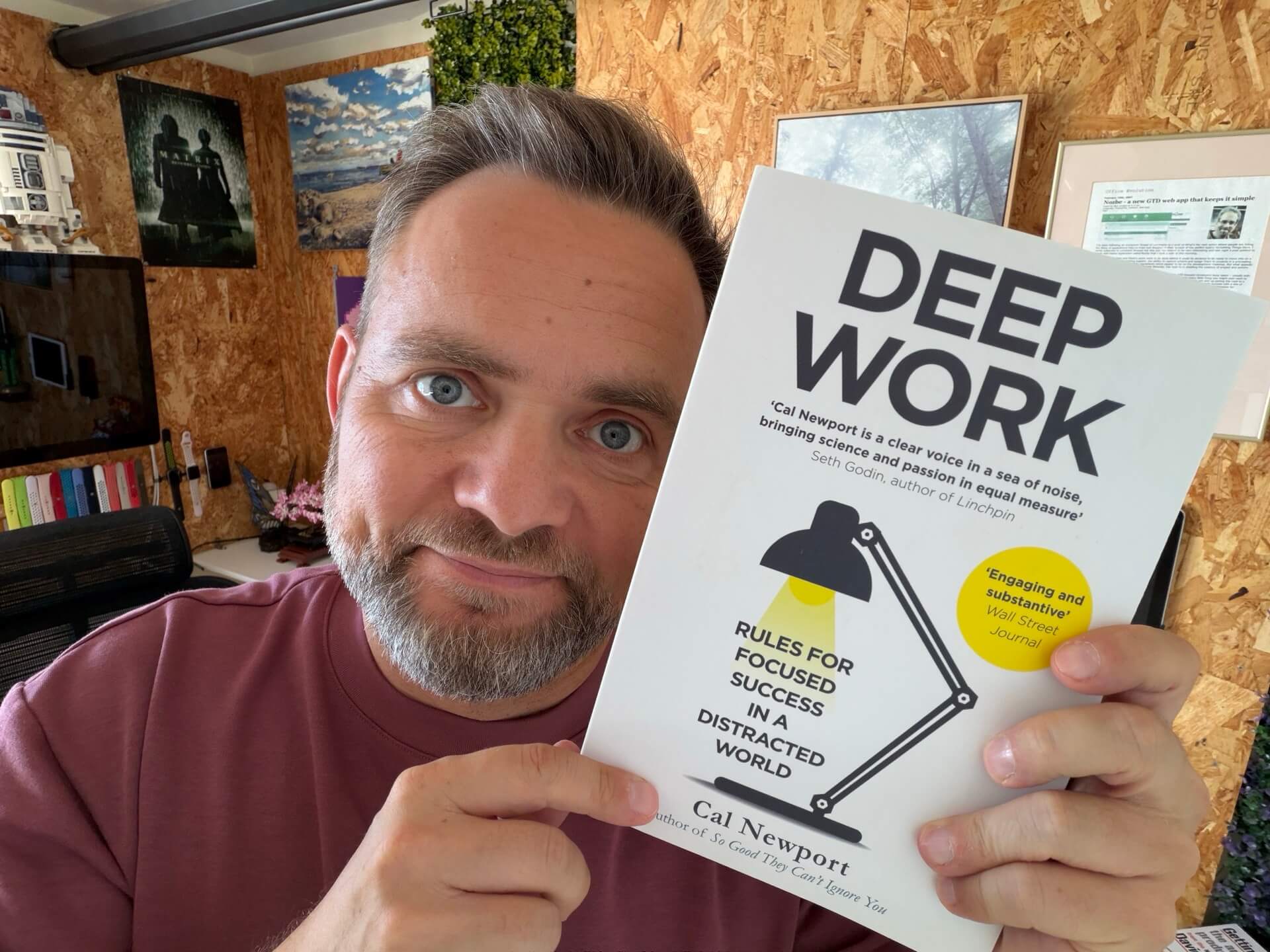
The book is about creating space and time for Deep work, which means a professional activity performed without distraction that pushes your cognitive limits, resulting in the creation of new value and skill improvement. It contrasts sharply with shallow work, which includes routine, logistical tasks often completed while distracted.
In today’s distracted world populated by constant communication, social media, and open-office environments, deep work is increasingly rare but also extremely valuable. Being able to focus and work distraction-free is a skill that you have to cultivate!
Here are some tips:
- Dedicate specific, uninterrupted blocks of time for focused, high-intensity work.
- Create rituals and environments that foster deep concentration.
- Limit or eliminate distractions like social media and email during deep work sessions.
After reading this book I started to plan my week in such a way that I always have dedicated time for deep work.
BTW, I also discussed this book with my-co host Radek on the episode 46 of The Podcast.
📕 Get Cal Newport’s Deep Work on Amazon or Audible.
💬 Discuss this book on Mastodon or LinkedIn.
Book 4 - Gary Keller and Jay Papasan’s One Thing
I had too many priorities… and to many “important” things to do every day… and then this book came along telling me that instead of planning several things to do today, I should focus on just 1 thing? Just ONE? Something that will make everything else easier or unnecessary, applying the Pareto principle that 20% of effort drives 80% of results. The key takeaway from the book One Thing - The Surprisingly Simple Truth Behind Extraordinary Results is the FOCUSING QUESTION:
“What’s the ONE thing I can do such that by doing it everything else will be easier or unnecessary?”
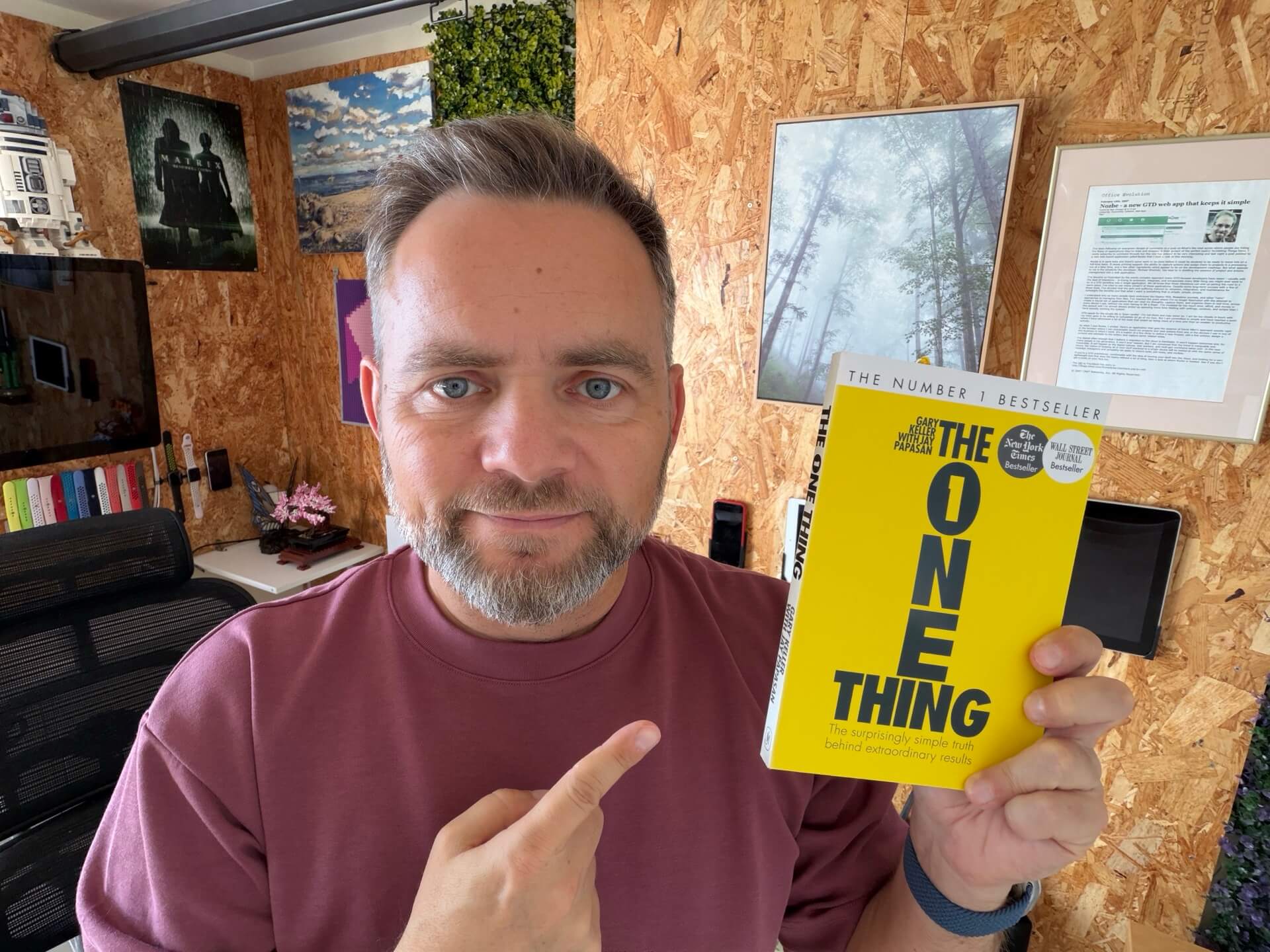
Just like in Deep Work I learned that I need to make time for my focused work, this book helps me choose what to work on. It talks about pushing a domino where the right first step triggers a chain reaction leading to bigger outcomes over time. I like this phrase of Go Small to Go Big which means narrowing focus to what matters most as it produces better results than multitasking or trying to do many things at once.
📕 Get Gary Keller and Jay Papasan’s One Thing on Amazon or Audible.
💬 Discuss this book on Mastodon or LinkedIn.
Book 5 - Derek Sivers’ Hell Yeah or No
I found myself saying YES to too many things… and realized I was a recovering people-pleaser and I felt trapped. Then I found this book which helped me build a simple filter that helped me say no to mediocre options, freeing up time and energy to devote to what truly matters and excites me:
If something that you’re about to do, does not excite you to say “Hell yeah!” with enthusiasm, the answer should be a “No.” and you should give it up completely.
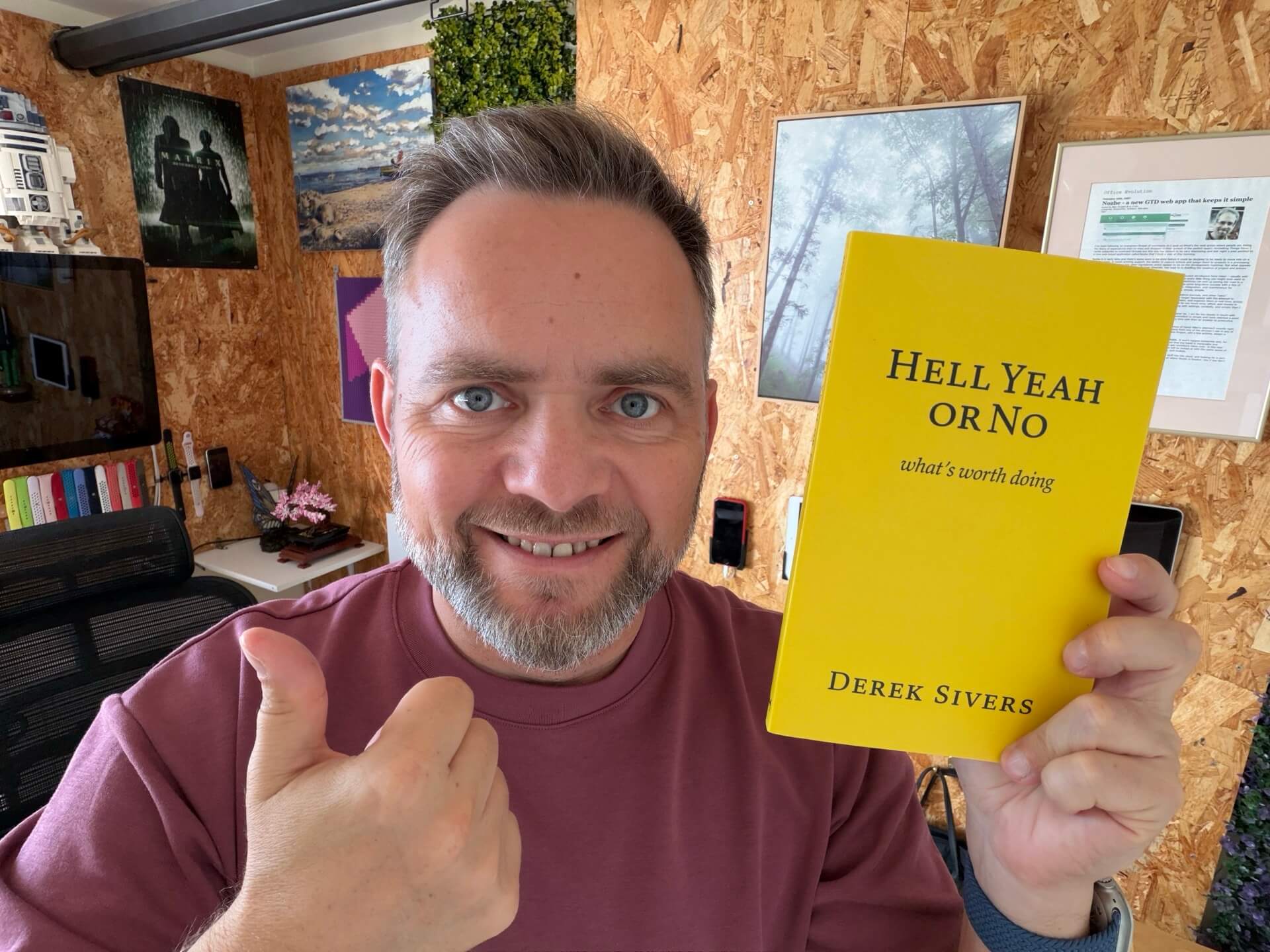
I love Derek Sivers. My web site is inspired by his web site. I even have a “Now page” just like he has. And his book, which is short and sweet helps bring the ideas from Deep Work and One Thing home:
- Say no to almost everything to protect your time
- Your actions reflect your core values — pay attention to what you repeatedly say yes to.
- Address overwhelm by simplifying choices
- Embrace fear - pursue what scares you most.
- Life is about choosing growth and risk over safety
📕 You can buy this book directly from Derek’s online book store.
💬 Discuss this book on Mastodon or LinkedIn.
Book 6 - Greg McKeown’s Essentialism
I hate this book, because it’s so good. I re-read it every year to put myself in a mindset of searching what’s truly essential for my career each time. It’s advice from Hell Yeah and One Thing but explored in more detail. This is my favorite book of all time. Greg McKeown in “Essentialism - The Disciplined Pursuit of Less but Better” motivates me to focus on what truly matters by identifying the vital few tasks that contribute most to my success and happiness, and eliminating everything else.
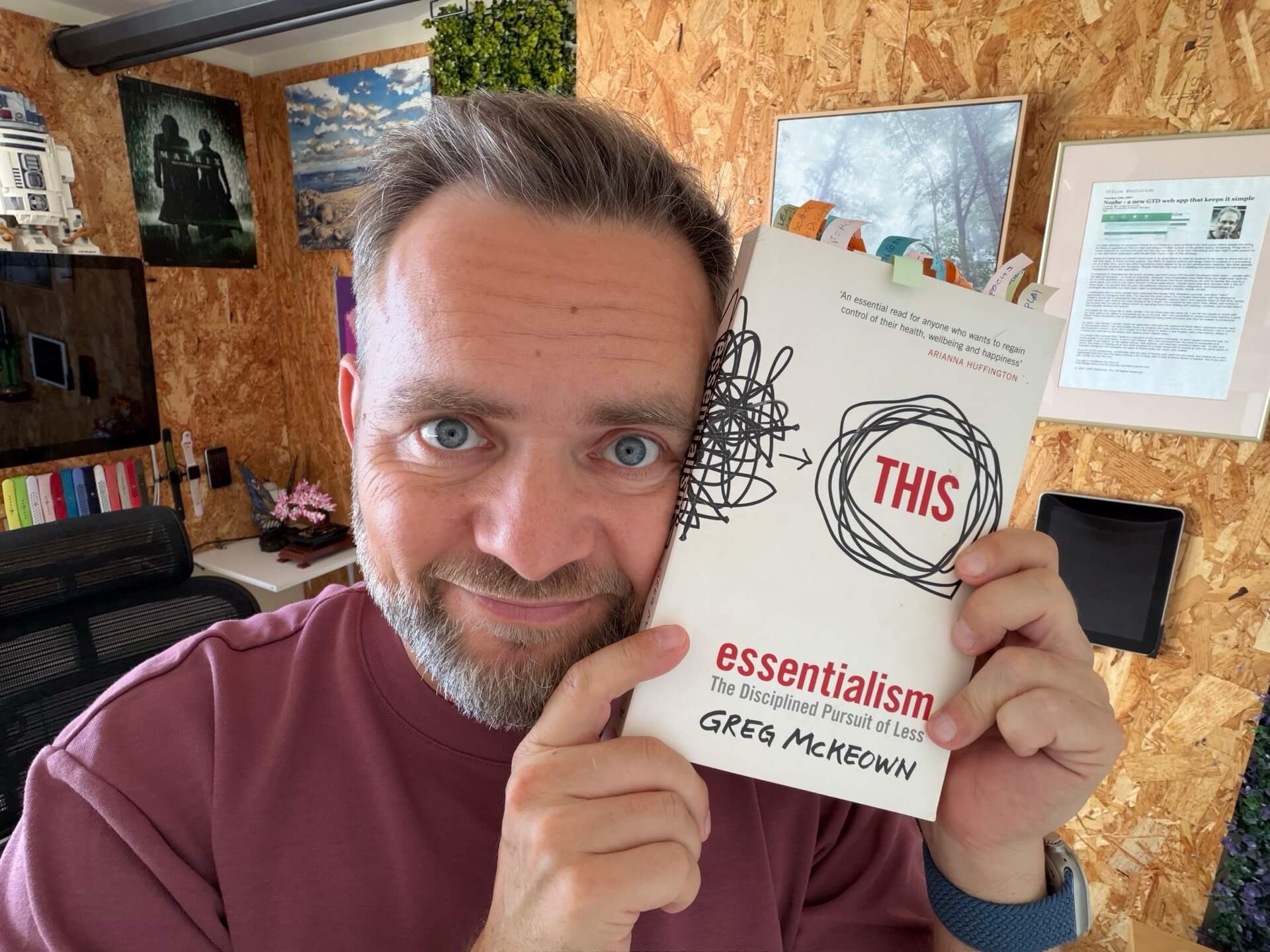
- Essentialism is the disciplined pursuit of less but better. It involves determining where your highest contribution lies and then focusing your time and energy there, while saying no to non-essentials.
- The Paradox of Success: Success often unlocks more options and demands that can distract you from why you became successful initially. Tell me about it!
- Choice and Trade-offs: Essentialism stresses that you always have a choice in how you spend your time. Recognizing that you cannot do everything, trade-offs are inevitable and must be made consciously to focus on what matters most. I have hard time acknowledging that in most situations there are trade-offs.
- The Essentialist Mindset is about saying “I choose to” rather than “I have to.” and discerning the vital few from the trivial many by asking “What truly matters?”
Radek and I discussed this book at length also on the episode #112 of The Podcast.
📕 Get Greg McKeown’s Essentialism on Amazon or Audible.
💬 Discuss this book on Mastodon or LinkedIn.
Book 7 - James Clear’s Atomic Habits
Most of the days I don’t rely on my creative brain but on habits I’ve built over the years and the book by James Clear “Atomic Habits - An Easy and Proven Way to Build Good Habits and Break Bad Ones” helped me with that. The book’s central message is that:
Tiny improvements, repeated over time, compound into major transformations in every area of life.
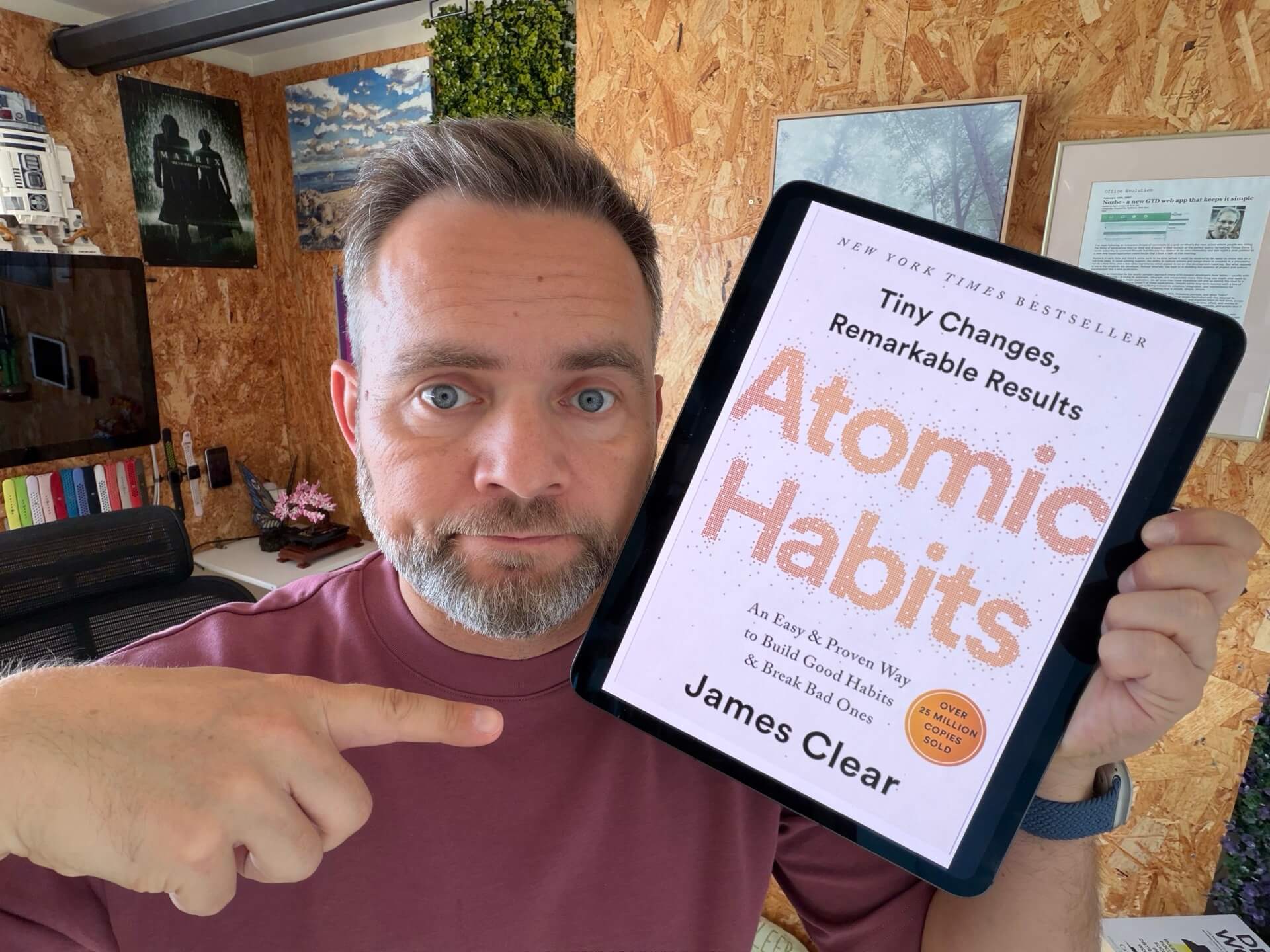
I love it. I’m all about incremental upgrades and iteration. Even though Greg McKeown wrote a book called “Effortless”, this one is even better. It’s a practical guide to making small, consistent changes that lead to remarkable long-term results:
- The 1% Improvement Principle - Small daily improvements (just 1% better each day) lead to exponential growth over time.
- Identity-Based Habits - Instead of focusing on goals (“I want to lose weight”), focus on who you want to become (“I am the kind of person who is healthy”).
- Systems Over Goals - Goals are about results, but systems are about processes. Just focus on daily disciplines rather than distant outcomes.
- The Habit Loop Every habit follows a four-step neurological loop: Cue → Craving → Response → Reward. Understanding this cycle helps you consciously design or disrupt habits at each stage.
- Break Bad Habits with the framework of making the cue obvious, craving attractive, response easy and reward satisfying.
Additional takeaways:
- Habits compound: Small actions repeated regularly shape outcomes more effectively than dramatic one-time efforts.
- Environment matters: Design your surroundings to nudge better behavior (e.g., placing healthy snacks where you see them).
- Repetition beats motivation: Mastery comes from consistency, not perfection
- Habit stacking: Pair a new habit with an existing one (e.g., “After I make coffee, I will review my goals”) to anchor it in your routine.
- Two-minute rule: Start habits in their simplest form — any new habit should take less than two minutes at first (e.g. “Open notebook” instead of “write a novel”).
- Focus on identity: Each small action is a “vote” for the type of person you want to become.
It is less about massive change and more about building powerful systems that make positive behaviors natural, automatic, and sustainable — one tiny improvement at a time.
📕 Get James Clear’s Atomic Habits on Amazon or Audible.
💬 Discuss this book on Mastodon or LinkedIn.
Book 8 - Mark Manson’s Subtle Art of Not Giving a Fuck
I’m an emotional person. I care too much. I give too many fucks about things that are out of my control. That’s why this book helps me decide as to what’s not a “Hell Yeah” for me. The core idea is to be selective about what we care about and accepting responsibility for our choices. Mark Manson’s “Subtle Art of Not Giving a Fuck - A counterintuitive approach to living a good life” challenges conventional positivity and promotes embracing life’s struggles to find meaning and happiness.
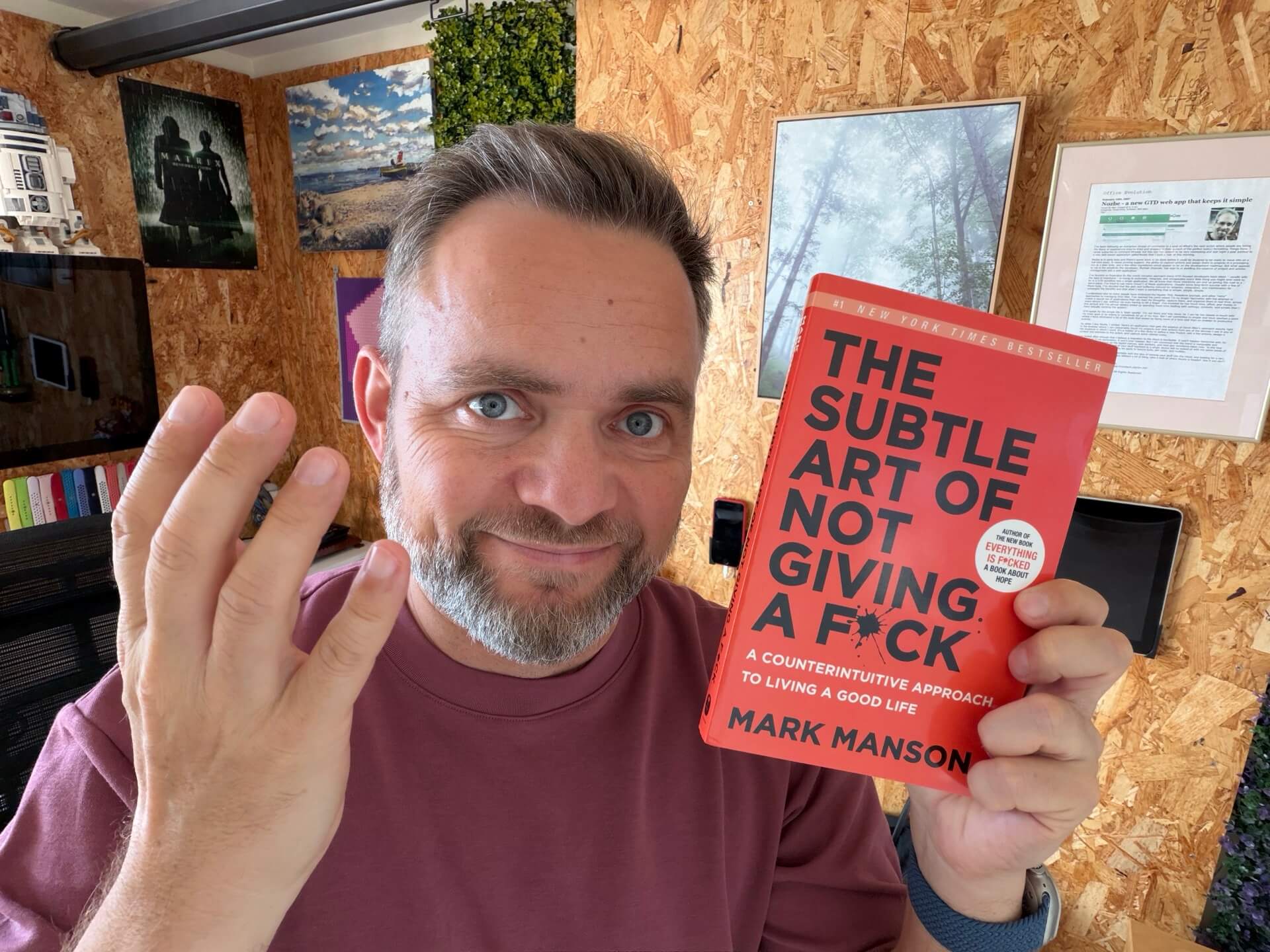
- Not Giving a Fuck: It doesn’t mean being indifferent or careless - it means choosing what to care about
- Life is a Series of Problems: Happiness comes from solving problems, not avoiding them.
- Responsibility Over Fault: We cannot control everything that happens, but we always control how we respond (just like in 7 Habits!)
- Value-Based Living: Prioritize values you can control (e.g., honesty, kindness) over external or uncontrollable ones (e.g., popularity) for a healthier mindset.
- Acceptance of Failure and Limitation: Failure and rejection are part of growth. Accepting limitations and embracing failure leads to maturity and resilience.
My favorite quote from this book is this:
You and everyone you know will be dead soon and in the short amount of time between here and there you have a limited number of fucks to give. Very few in fact. If you go around giving fuck about everything and everyone without conscious thought or choice, well, you’re going to get fucked.
We liked this book so much that we discussed it also on the episode 201 of The Podcast.
📕 Get Mark Manson’s Subtle Art of Not Giving a Fuck on Amazon or Audible.
💬 Discuss this book on Mastodon or LinkedIn.
Book 9 - Michael Gerber’s The E‑Myth
As a small business owner I found myself working too much IN the company. Being too busy with everything that was going on. Believing that I was the only person to fix it all! I was wrong…
Michael Gerber’s “The E‑Myth - Why Most Small Businesses Don’t Work and What to Do About It” showed up for me when I needed it the most. The book dismantles the “entrepreneurial myth” — the false belief that technical skill alone is enough to build a thriving business. Instead, the book teaches how to design and manage a business as a structured, scalable system that works independently of the owner.
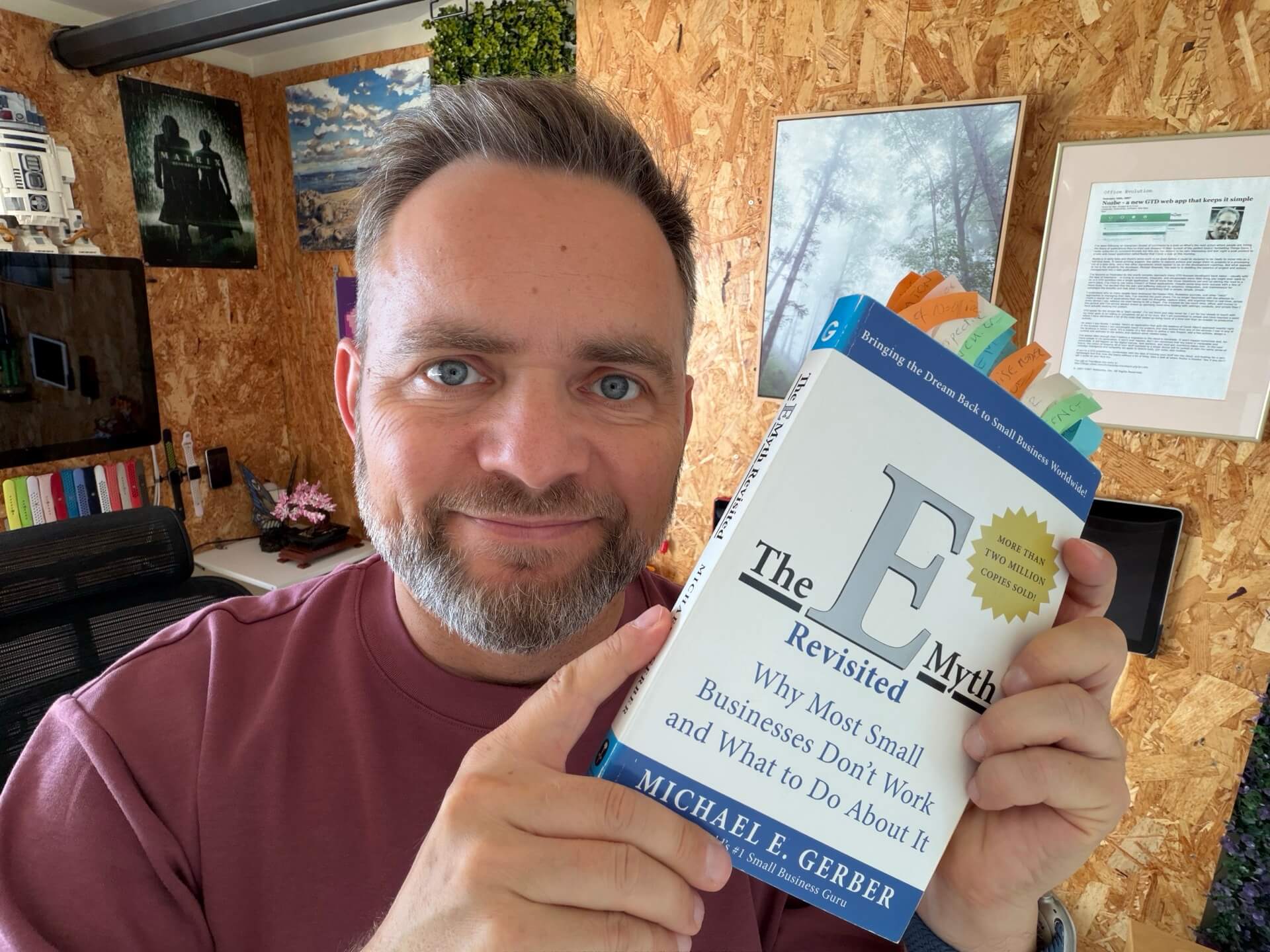
The book shows how an a successful business owner must balance three identities:
- Technician does the work.
- Manager creates order, plans, and organizes.
- Entrepreneur envisions the future, drives innovation, and strategizes growth.
Most small business owners are technicians who suffer an “entrepreneurial seizure”: they start a company thinking their technical skill will guarantee success. Gerber argues that this mindset leads to burnout and business failure unless the owner learns to think like a manager and entrepreneur.
Work ON your business, not just IN it!
This book helped me learn to step back from day‑to‑day operations and focus on building systems that allow the business to function without constant personal involvement. Thanks to this book I’m mostly not needed for day-to-day operation of my business and I can take a month-long sabbatical each year.
The book forces you to think of your business like designing a franchise. This means developing repeatable processes, clear documentation, and consistent results so that anyone could run your business.
📕 Get Michael Gerber’s The E‑Myth revisited on Amazon or Audible.
💬 Discuss this book on Mastodon or LinkedIn.
Book 10 - my very own 10 Steps to Ultimate Productivity
Back in 2018 I wrote my very own book inspired by all the books above and my own experiences running Nozbe and I was giving it away to my customers. Here are my 10 steps:
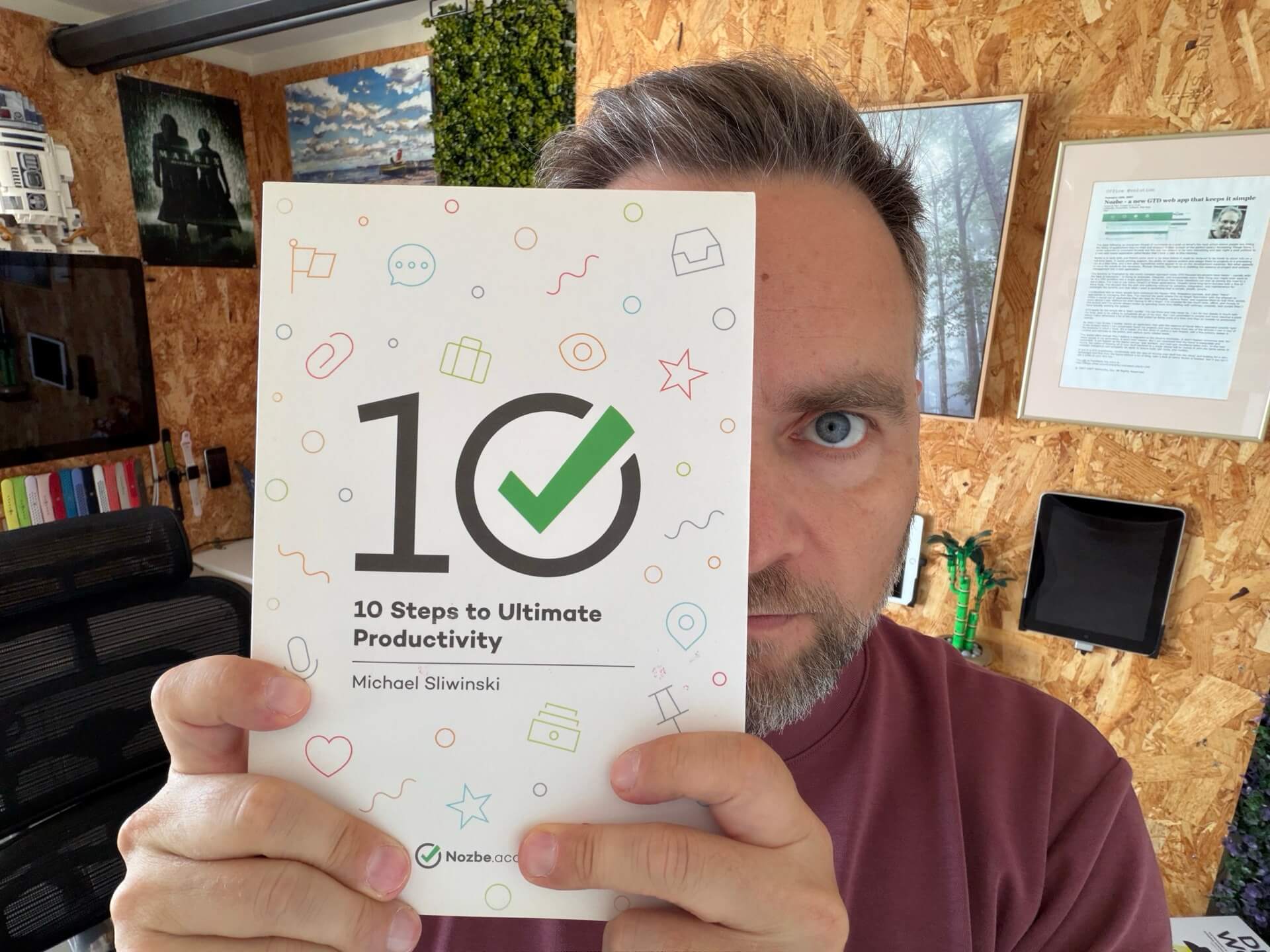
- Step 0. Two-minute rule - if something can be done in less than 2 minutes, od it now (from David Allen’s GTD book).
- Step 1. Clear Your Mind - why it’s important to put stuff into your trusted system.
- Step 2. Organize tasks in projects - this way you know exactly what needs to be done.
- Step 3. Prioritize - answer: what’s the next action that moves this forward? and do just that.
- Step 4. Work from Anywhere - embrace smartphones and cloud sync to have all the information at your fingertips at all times.
- Step 5. Collaborate with Others - you’re not alone so make sure to learn to delegate tasks and iron out details in comments attached to these tasks.
- Step 6. Batch Tasks - learn to group tasks by context, place or energy level to be able to do some of them at one go.
- Step 7. Go Paperless - take control of your documents and scan everything and attach them to their tasks if they are actionable to make execution effortless.
- Step 8. Review Your System Regularly - schedule weekly, quarterly and yearly reviews to make sure you have the right perspective on things to do.
- Step 9. Tame Your Email - make sure to only use emails for handshakes and not for ongoing projects. Be responsive by answering quickly.
- Step 10. Keep Improving - keep learning, keep studying, keep evolving your system. Keep reading books! Duh!
📕 You can get my book here for free at nozbe.com/10steps.
💬 Discuss this book on Mastodon or LinkedIn.
These are my top 10 books of all time - what are yours?
I hope this list inspires you to read these books and try them out. I’ve re-read some of them many times. I’ve been going back to them in many situations. These are the books that shaped me as a productivity enthusiast and business owner. What are yours?
💬 Looking forward to your book recommendations on [Mastodon] or LinkedIn. Talk to you there!
P.S. I’ve discussed these books on my podcast…
If you want to listen to me talk about these books, check out episode 85 of the #NoOffice podcast: